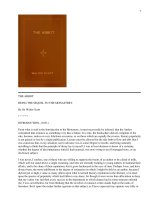A CALLING DIRECTOR''''S VERSION TO THE STAGE pot
Bạn đang xem bản rút gọn của tài liệu. Xem và tải ngay bản đầy đủ của tài liệu tại đây (7.19 MB, 330 trang )
Performing with Excellence for the Lord
Calling
a Calling
A HIS COMPANY PUBLICATION
DIRECTOR’S VERSION
to the
StageStage
to the Stage
a Calling
2
C
o
r
.
4
:
5
-
7
writings
the
of
ii
A Calling to the Stage
© 2011 David S. Lampel. All rights reserved.
Unless otherwise indicated, all scripture is from the New American Standard Bible, Updated
Edition, © 1995 by e Lockman Foundation. NIV quotations are from the Holy Bible: New
International Version, Copyright 1973, 1978, 1984 by the International Bible Society. Used
by permission.
Quotations by Laurence Olivier are from On Acting, Simon & Schuster, 1986.
Quotations by Uta Hagen are from A Challenge for the Actor, Charles Scribners Sons, 1991.
Quotations by John Gielgud are from Gielgud: An Actor and His Time, Clarkson N. Potter, Inc., 1980.
Other quotations are from Actors on Acting, by Joanmarie Kalter, Sterling Publishing, 1979.
is book, A Calling to the Stage: Director’s Version, is published in PDF format only, and re-
quires the Adobe Acrobat Reader. e Acrobat Reader is free from Adobe, and may be down-
loaded from their web site at ://... Individuals may download a copy of
this book for personal use, as well as print multiple copies of it or its companion volume, A
Calling to the Stage: Actor’s Version. for distribution to members of a drama group—so long
as it is distributed free-of-charge, in its entirety (including this copyright notice), and no
changes are made to the text prior to printing.
To request any other uses of this book, contact David S. Lampel by telephone at
515-462-1971, or by leaving a message at our web site at ://..
Director’s Version
First Edition / May 2003
Second Edition / July 2011
To download the PDF file, visit the His Company web site at ://..
iii
preface ix
introduction xiii
What is Book is Not xiii
What is Book Is xiv
Part One: The His Company Way
1. A Brief History 3
In the Beginning… 3
A Commission to Serve 6
Curtain 6
A Hard Lesson 7
Today—and Beyond? 9
By God’s Grace 10
2. Our Philosophy 1
1
Foundational Principles 11
In the Real World 14
Finances 18
Expressions of anksgiving 21
e His Company Way 22
3. The Calling 2
5
Answering the Questions 26
4. To Be, or Not to Be 2
9
Security vs. Artistic Freedom 30
e Call 31
Personnel 32
Rehearsal Space 34
e Essentials 35
e Non-essentials 38
e Production Process 40
Part Two: A Director’s Guide
1. Selecting the Play 47
More than just Killing Time 48
Obtaining a Script 49
Now What? 49
Imagining 51
contents
iv
A Calling to the Stage
Faithful to the Source 53
2. The Script in Hand 5
5
e Scripts 57
Your Preparation 57
e Compromise 58
Drawing the Line 60
3. The Reading Session 6
1
e Actor 62
e Character 63
Designing the Session 67
Setting the Scene 68
A Proper Balance 69
e Reading 69
Homework 72
4. Blocking: Philosophy & Method 7
3
Painting the Canvas 75
Blocking Conventions 77
5. Blocking the Play 8
1
Marking Your Script 82
Rush Hour Traffic 88
Ready for Rehearsal 92
6. The Blocking Rehearsal 9
5
Breadth and Length 96
Prayer 97
Going rough the Paces 98
Review 99
Debriefing 100
7.
Rehearsal Preparation 101
Preparation and Review 102
Venue Selection 104
8. Regular Rehearsals 107
Finding a Method that Works 108
e Director as Communicator 108
A Personal Style 109
A Sanctifying Process 110
Expecting Too Much 111
A Logical Sequence 112
Beyond Mimicry 113
More an Recitation 114
v
9. The Technical Meeting 117
A Study in Contrast 117
Perspective 119
Notebooks 120
Ground Rules 120
Status Reports 122
Page by Page 123
e Debriefing 128
10. The Technica
l Rehearsal 129
e Actors 130
Keeping Contact 131
Personal Readiness 131
e Complete Evening 133
Levels of Importance 133
Staying Late 134
e Important Debriefing 134
11. Dress Rehearsal 13
7
Making a Difference 138
Details 138
Preliminaries 139
Run-through 140
Debriefing 140
Facing Reality 142
12. Opening Night 14
3
e Calm Eye in the Backstage Storm 144
A New Level 145
Final Preparation 145
Attitude and Body Language 146
A Biblical Hope 147
Before the rone 147
Proper Alignment 148
On Station 149
After Final Curtain 150
e Afterglow 151
Part Three: An Actor’s Guide
1. The Script in Hand 155
Highlight 156
Introductory Notes 156
Reading the Script 157
vi
A Calling to the Stage
Memorization 158
2. The Readin
g Session 161
Being Brave 161
Taking Notes 163
Literally 164
Using Imagery 165
3.
Blocking 169
e Dance 170
Blocking Vernacular 170
e Real World 174
Blocking: Review 177
4.
Regular Rehearsals 179
e Habit of Review 180
Be Dependable 180
e Script in Hand 181
Remaining Flexible 182
No Excuses 183
5. The Technica
l Rehearsal 187
Working Out the Kinks 188
Your Opportunity 190
6. Dress Rehearsal 19
3
Dressing Up 193
In Rehearsal: A Real Performance 195
e Debriefing 198
7. Opening Night 20
1
Homework Redux 201
Community 203
e Essential Audience 203
Over the Top 204
Stage Fright 206
8. Curtain Call 20
9
A Gracious Response 210
e Debriefing 210
Post-performance Checklist 211
Motive 212
Part Four: The Next Level
1. Memorization 217
Non-negotiables 217
Methods 218
vii
2. The Character 221
Kit Bag 222
Beginning With the Facts 222
Learning All You Can 224
Transference 225
Observation 226
e Hard Slog 227
Working At It 229
On Stage 230
3.
Rehearsing at Home 231
e Professional Way 231
Character-based 232
e Goal 232
e Home Stage 233
4. Being Somethin
g One is Not 237
Unseemly Actions 237
Displays of Affection 239
e Final Call 240
5. The Adaptable
Actor 241
Staying Loose 242
Space 243
Movement 245
Physical Relationship 247
Inhabiting the Imaginary World 247
6. Costuming th
e Biblical Character 249
Creating the Biblical Costume 250
Some Indelicate Advice 251
e Accouterments 253
Details 255
References 256
7. True to the Word
: a case study 259
A Painful Good-bye 260
Only For a Time 262
8. First Time
: a case study 265
Before you Rehearse 267
About the Performance
271
Devotion 272
9. On
Excellence 273
Beginning 274
e Debt 275
viii
A Calling to the Stage
e Reason Why 276
To Be Like Him 278
10. The Rehearsa
l Schedule 281
Scheduling 283
In Practice 286
Blocking Rehearsal 286
Organizing Efficient Rehearsals 287
e Completed Schedule 291
Distribution 294
11. Behind the Scenes 29
5
Assistant Director 296
Assistant to the Director 297
Stage Manager 298
Wardrobe 299
Makeup 300
Sound 301
Lights 302
Set Design 304
Properties 305
A Dynamic Contribution 305
an afterword 30
7
index 309
figures
Figure 1.1 — The fundamental components underlying the His Company philosophy 12
Figure 1.2 — Lightweight canvas splatter-painted to look like stone from a distance 38
Figure 1.3 — Two views of a homemade lighting control board 39
Figure 2.1 — Established blocking conventions to designate areas of the stage (director’s perspective) 78
Figure 2.2 — Basic diagram for Bethlehem set in Vacancy 82
Figure 2.3 — Preliminary rough sketch of character movement in scene using line numbers 88
Figure 2.4 — The changing relationship between director and actor over the course of rehearsals 130
Figure 3.1 — The changing relationship between actor and written script over the course of rehearsals 164
Figure 3.2 — Modern theatre design 171
Figure 3.3 — Early theatre design 171
Figure 3.4 — Established blocking conventions to designate areas of the stage 172
Figures 4.1-4.3 — Three views of a costume made from secondhand drapery fabric for Judas in hell 251
ix
T
. A professional actor per-
forming on the stages of the New York theatre would find its
counsel to be rather insulting. Church theatre, however, is not
typically peopled by professionals, but by dedicated amateurs will-
ing to risk playing the fool because of their love for the Lord. ey
are motivated not by fame, the hope of adulation or wealth, but by a
personal and corporate devotion to God.
e dedicated amateur’s training—as well as the training for their
directors—is often limited to that offered by their high school drama
coach, and may have occurred ten or twenty years in the past. ey
are often not self-starters, but require constant coaching, direction,
encouragement and prodding. ey welcome generous, often meticu-
lous instruction, and without it would probably run screaming from
the stage—or never show up at all.
preface
x
A Calling to the Stage
is book makes no claim of universal appeal, but has been written
for the possibly experienced, but still amateur director and actor. It is
based on practical methods that have been put into use many times—
methods that work. is book has been written, most of all, for those
who have accepted their talents as gifts from the Lord, to be used at
His bidding, in His service, and to His glory alone.
For this reason, the reader will not find the word “volunteer”—not
used in a kind way, that is—anywhere in the pages that follow.
Church drama ministries—indeed, churches in general—have been
infected with a philosophy of volunteerism. is is revealed in re-
marks such as “What do you expect—they’re only volunteers,” or
“You can’t really demand much from volunteers.” From the lips of
committee chairpersons, to music and drama directors, these words
are used repeatedly to excuse the shoddy behavior and performance
of people under their direction. But no matter how you approach it,
brothers and sisters, we are anything but volunteers.
You could approach it from the perspective of return on one’s efforts.
Volunteers work for free; they put nothing in the bank from their
labors. But the faithful, humble, committed servant of God has a
bank account filled with daily deposits. Whether washing dishes in
the church kitchen, sweeping the front steps, balancing the church’s
books, reading Scripture in the Sunday morning service or singing
the biggest solo in the Christmas musical, the believer who serves his
or her God with excellence is the best-paid person around.
You could also approach it from the servanthood perspective, under-
standing that we were purchased by a Master whom we now must
serve. We don’t “volunteer” to serve Him; we serve out of obedi-
ence—no less an obedience than that which caused Abraham to lift
the knife over the head of his only son.
e foundational philosophy of His Company—that out of which every-
thing in the pages that follow derives—is that every child of God has,
by the sacrificial blood of Christ, been purchased. He no longer belongs
to himself. Every skill, every passion, every capability emanates from,
belongs to, and is to be used in the service of God and His kingdom.
Or do you not know
that…you are not
your own? For you
have been bought
with a price: therefore
glorify God in your
body.
1 Corinthians 6:19-20
xi
Volunteers? Not a one of us. We all have been purchased—and some
of us have been purchased for the stage.
Acknowledgements
Most things issued from this desk are proofed and edited by my good
wife, Linda. I am dependent on her wisdom and common sense to
catch my mistakes, polish my prose, and add her opinions throughout
all stages of a project. And her contributions to this project have been
even more extensive. I am deeply indebted to Linda for her editing
skills, her consistent attention to detail—and for not abandoning me
to my own curious tangents. is book is made better because of her.
I would also like to thank the many pastors who have permitted us
the privilege of serving the Lord before their congregations—and
who have, on occasion, served as this writer’s “editors-at-large” when
they have graciously corrected an errant snippet of theology.
Finally, I would like to acknowledge the contribution of all those who,
over the years, have been numbered among the members and sup-
porters of His Company. ey lived what you are reading in this book,
and it was while working with them that I developed the techniques
passed along here. I thank them all: for their help, for putting up with
me, and for all the warming memories.
Winterset, Iowa
July 2011
For from Him and
through Him and to
Him are all things.
To Him be the glory
forever. Amen.
Romans 11:36
xii
A Calling to the Stage
xiii
T
as it is
a how-to manual. His Company has plotted its own course,
striving always to remain true to its calling, rather than
following the vagaries of the times. It has been called to a specific
purpose, fitted into the vast array of God’s holdings alongside those
that may have a different calling. We were called, from the beginning,
not just to entertain, but to deepen believers’ understanding of God’s
word and His ways by illustrating Scripture and its principles.
What This Book is Not
Our work has always been geared toward the adult member of the
Body of Christ. For this reason, while some of what follows may inad-
vertently apply, the reader will not find here techniques for evange-
lism, street theatre, mime or puppetry. And while children have often
benefited from our performances, and may even have had small parts
introduction
xiv
A Calling to the Stage
within larger productions, our work has ultimately been for the adult
(or at least older teenage) cast, produced with the adult audience in
mind. So the reader will not learn from this volume how to create a
drama ministry with or for children.
In fact, this book does not tell anyone how to create a “ministry”—
that ill-used, abused, and overworked word so effortlessly bandied
about today. Our philosophy is clean, uncluttered, and direct: God has
called us to this work; therefore, we must be about it. He moves us
about; He assigns us tasks large and small; He brings joy and sorrow;
He both supplies and removes fellow workers. Circumstances may
change, but the task remains the same: Declare God’s truth from the
stage. So that is what we do. If you choose to call that a “ministry,”
then that is your privilege. We just call it, well, our calling.
What This Book Is
What does follow is a telling of our story—from idea to realization,
mistakes along with brilliant triumphs—and a systematic, applicable
guide to our methods. Our way is not the only way to successfully
produce drama in the church, but it is one way that works—and our
history will mirror the beginnings of many groups.
e advice in this book is short on organization, but long on practical
doing. We do not believe in serving the Lord by committee or board.
If you do, then that is your privilege. It is our position, however, that
committees invariably gum up the works, sapping the vital energy
and creative juices that bring essential life to a work such as this.
A Director’s Version
A Calling to the Stage is published in two versions: one for the director,
and one for the individual actor—the latter a subset of the former.
is version of A Calling to the Stage is for the director.
e methods in this book are applicable to a wide range of group
types, including a company of players within a church or school, a
choir that periodically draws from its ranks for dramatic roles, or an
independent troupe, such as His Company. e book can be taken
as a whole, or portions gleaned for individual use. It makes a good
This book assumes that the “di-
rector”—the person in charge
of moving people about on
stage—is also the person in
charge of the overall acting
company. In most churches
of small to moderate size, and
in some smaller independent
companies as well, there is one
person who serves as director,
producer, governing board and
cheerleader. But terminology
should not be an obstacle to
the use of the information of-
fered here. No matter your title,
if you are in a role of leadership
in Christian drama, then this
book is for you.
Also in this book, more often
than not the masculine pro-
noun is used. This traditional
literary device is employed for
brevity alone, and should not
be interpreted as any slight of
those of the female persuasion.
xv
bookshelf reference, as well as an excellent curriculum for instruction
(especially in conjunction with the Actor’s version of this volume).
Part One tells the His Company story, and describes our philosophy
of service to the Lord.
Chapter One: “A Brief History”
Chapter Two: “Our Philosophy”
Chapter ree: “e Calling”
Chapter Four: “To Be, or Not To Be”
Part Two is specifically for the director, conducting the leader of
church drama from the selection of a script through first perfor-
mance. Its chapters are geared toward the inexperienced, but will also
be of use to the experienced non-professional.
Chapter One: “Selecting the Play”
Chapter Two: “e Script in Hand”
Chapter ree: “e Reading Session”
Chapter Four: “Blocking: Philosophy and Method”
Chapter Five: “Blocking the Play”
Chapter Six: “e Blocking Rehearsal”
Chapter Seven: “Rehearsal Preparation”
Chapter Eight: “Regular Rehearsals”
Chapter Nine: “e Technical Meeting”
Chapter Ten: “e Technical Rehearsal”
Chapter Eleven: “Dress Rehearsal”
Chapter Twelve: “Opening Night”
Part ree is for the actor, a handbook for the amateur that takes
him or her through the production process from receiving a new
script through curtain call.
Chapter One: “e Script in Hand”
Chapter Two: “e Reading Session”
Chapter ree: “Blocking”
Chapter Four: “Regular Rehearsals”
Chapter Five: “e Technical Rehearsal”
Chapter Six: “Dress Rehearsal”
xvi
A Calling to the Stage
Chapter Seven: “Opening Night”
Chapter Eight: “Curtain Call”
Part Four includes important chapters that take the actor and direc-
tor deeper into the craft of the stage, and are meant to be used in
conjunction with earlier chapters.
Emphasis One: “Memorization”
Emphasis Two: “e Character”
Emphasis ree: “Rehearsing at Home”
Emphasis Four: “Being Something One is Not”
Emphasis Five: “e Adaptable Actor”
Emphasis Six: “Costuming the Biblical Character”
Emphasis Seven: “True to the Word: A Case Study”
Emphasis Eight: “First Time: A Case Study”
Emphasis Nine: “On Excellence”
Emphasis Ten: “e Rehearsal Schedule”
Emphasis Eleven: “Behind the Scenes”
is book may be downloaded and used by the individual, or down-
loaded by a leader, printed, and distributed to those in his or her
drama group.
However you use this book, use it to God’s glory. Just because his is
a public, charismatic craft, the Christian actor is not excused from an
attitude and motive of servanthood. We mount the stage to serve our
Lord: the gift came from Him; the gift belongs to Him; the gift is to
be used for Him.
1
The His Company Way
part
1
2
Part 2: A Director’s Guide
3
N
can or should slavishly fol-
low the His Company way. Our history was our own, and our
people a unique set of individuals. e methods put down
in this book are not intended as a guaranteed path to success (how-
ever one measures success) for every group of thespians. Nor will its
history be a perfect match for the beginnings of similar companies of
players.
But that is not to say that the reader will not benefit from the telling.
Our history is recorded here so that the Christian dramatist, direc-
tor or actor might glean valuable information to encourage, inspire,
edify—and that they might benefit as well from our many mistakes.
In the Beginning…
e history of His Company begins, appropriately, with an idea for
chapter
one
A Brief History
4
Part 1: e His Company Way
a sketch, and the tale is a poetic illustration of how we who carry
around in us the Spirit of God are intrinsically bound together, and
thereby influence the work of Christ’s Kingdom.
Just why I wrote the monologue for the apostle Peter, e Scarred
Rock, back in the early months of 1985 I can’t say. But once it was
completed, I handed it to the pastor for his thoughts on using the
seven-minute sketch in one of our Sunday morning services. His
response was both understated and ambitious. He not only liked the
idea, but suggested that I write eleven more—one for each disciple—
and he would schedule a series of sermons to match: one per week for
three months.
The Twelve
e idea was both exciting and frightening. As unofficial assistant
to our Music Minister, I had been writing narration and dialogue for
our musical productions for several years, but I quickly saw that this
would be a challenge of a different stripe. Not only would I need to
be doing a lot of writing, but I would also have to line up actors and
schedule overlapping rehearsals for all the sketches.
But the commission was accepted, and a schedule quickly worked out.
I cast e Scarred Rock and began an eight-week schedule of rehearsals
for that play. I established a routine that had me continuing to write
the succeeding plays in their order, while directing the next to be per-
formed. In the middle of each play’s rehearsal schedule, I would cast
and begin rehearsals for the next. On Sunday morning, August 11,
1985, e Scarred Rock was performed, and for the next eleven weeks
a new sketch was performed every Sunday morning. At the time that
the first sketch was being performed, the last in the series had not
even been written.
His Company
Meanwhile, the process of casting these twelve sketches and mono-
logues sparked a second idea. To cast these plays I had drawn from
the list of usual suspects—those who had taken roles in various
musicals and cantatas, and the odd larger play I had written and
staged, such as e Surrender (1984). But there was something about
the process of casting this succession of smaller plays that produced
5
A Brief History
the idea of creating an autonomous company of players that would
do this sort of thing on a continuing basis, at many churches, rather
than just the one.
As a result, on the evening of April 26, 1985 a group of seven or eight
people assembled in Linda’s and my home in San Diego, California.
ey (and others who were unable to attend) had all been invited to
participate in mapping out a new idea: the creation of a Christian
drama group to be called His Company.
During the course of that first meeting several points were discussed
and agreed upon, with one of the more important decisions being
that His Company would always be autonomous. We would remain
independent, not under the jurisdiction of any one church or organi-
zation. e first reason for this decision was to ensure our freedom
to minister to any and all denominations professing Jesus Christ as
Lord. e second reason was that His Company would then not be
governed by committee or pastoral fiat, free from church politics and
cumbersome organizational restraint.
Responsibility
is autonomy placed a greater responsibility on His Company to
stay true to its calling. Since it had no pastor, no Board of Deacons or
Elders keeping the group in line, it was incumbent upon its leaders
and members to zealously guard its integrity: Every script would be
judged against the undiluted truth of Scripture; our methods would
be continually judged against the life of Christ and the teachings of
His apostles. Our “Board” would be the pastors and music ministers
who reviewed each of our scripts before scheduling us to perform.
Even within the group, His Company was not organized by commit-
tee or run by consensus. We did assign responsibility for various de-
partments to individuals, such as wardrobe, makeup, or props design.
But the group was run, from the outset, as a benign dictatorship. It
was even agreed that auditions for roles in new productions would
be superfluous, since I already knew the strengths and limitations of
each actor—and generally wrote each script with specific individuals
already in mind. At one point I tried to delegate to a company man-
ager responsibility for contacting churches for performances, but that
For more on the His Company
philosophy of autonomy, see
Chapter Two, “Our Philosophy,”
in this part.
For more on script integrity,
see Emphasis Seven, “True to
the Word,” in Part Four.
6
Part 1: e His Company Way
met with only limited success, since the pastor would invariably require
a level of authority that could only come from the group’s leader.
A Commission to Serve
So we were off and running. Over the next few years we gradually
added more personnel, and performed around the San Diego area
doing sketches and one-acts for worship services, and the occasional
larger musical, three-act play, or evening of drama. By 1990 His Com-
pany consisted of seventeen people—including some who served not
on stage, but only in roles of support, behind the scenes.
During this period, we
never charged for any performance or service, nor asked for a
donation—although we sometimes were given voluntary love
offerings;
never charged anyone to become a member of the group, nor
“passed the hat” for expenses—although on a few occasions some
members volunteered to cover some expenses for props, etc.;
never had our own theatre or home base—although we accepted
the gracious use of the facilities of our home church for most
rehearsals;
never held auditions—either for productions, or to join the
group;
never performed any script written by someone else.
Curtain
In the winter of 1990/91, Linda and I sold our house in San Diego,
packed up all our earthly belongings and moved back to our home
state of Iowa. Needless to say, at this point His Company—at least as
it was originally conceived—ceased to exist. (Oddly enough, not one
person of the company was willing to leave sunny Southern California
to relocate with us to the Midwest. Funny, that.)
•
•
•
•
•
Some further explanation
may be helpful regarding the
last item in this list, referring
to our script selection, which
sounds frightfully self-serving.
Certainly, since the one leading
the group and directing most
of the plays was, by trade, a
writer, the natural process
would be to perform his work.
But beyond that, the Lord
seemed to be telling us that,
for whatever His reason, this
was how He wanted it.
At one point we ordered a
small booklet of three plays
from the same house that
had published several of my
own scripts. But the period of
several rehearsals held for two
of these plays was so fraught
with disaster and bizarre oc-
currences, that we could only
conclude that we were not to
be performing those plays.
From then on, we never even
tried to use other scripts.
Besides, most of our work was
commissioned for a specic
venue or occasion, and per-
formed by a closed company
(no open auditions). So it only
made sense in these circum-
stances to write and perform
our own work.
7
A Brief History
So at this point His Company became something different—in vis-
ible, human terms—from what it had been before. Now it would be
smaller for a while, consisting of just two people: Linda and me. But
this reduction in personnel in no way limited our work. Indeed, in
some ways it freed it from many of the restraints imposed by working
with a larger group.
For the next couple of years Linda and I performed in the local church
we were attending (the congregation into which I had been born, lo
so long ago), and I continued to fulfill commissions for new scripts.
When we purchased our present home, and began searching God’s
will for a church home, He eventually drew us to a congregation in
Des Moines. Once again, by talking to people and making ourselves
available, we began again the process of taking Christian drama
around to churches in the area. By the beginning of 1993 I had writ-
ten a new Easter musical for our church (Crown Him with Glory), and
Linda and I were performing sketches in the worship services.
rough our work in the Easter musical, and through the gracious
assistance of a member of the congregation in organizing a social eve-
ning in which we could present our credentials to a small group who
might be interested, we brought into our work another couple—and
set to performing some smaller pieces with them.
A Hard Lesson
Right about here, however, we—rather, I—made a fatal mistake.
e original incarnation of His Company, back in San Diego, had con-
sisted of people who had worked with me for a number of years, in
various capacities. I had sat next to them in choir; we had had them
over for Bible Study, or dinner; and even before the creation of His
Company, we had worked together with them in many other produc-
tions. ey were friends, and out of this friendship grew a close bond
that—without my realizing it at the time—was infused into His Com-
pany. I had become accustomed to their level of trust and respect, not
realizing that that level of respect and trust was based on more than
what we were doing at the time. ey trusted me—not just because of
my gifts, but because they knew me as a person.
Please Note: any reference in
this book or at our web site to
our “writing a musical” means
that we compiled existing
music and wrote new drama
or narration to create a new
package.
We do not compose or arrange
music.









